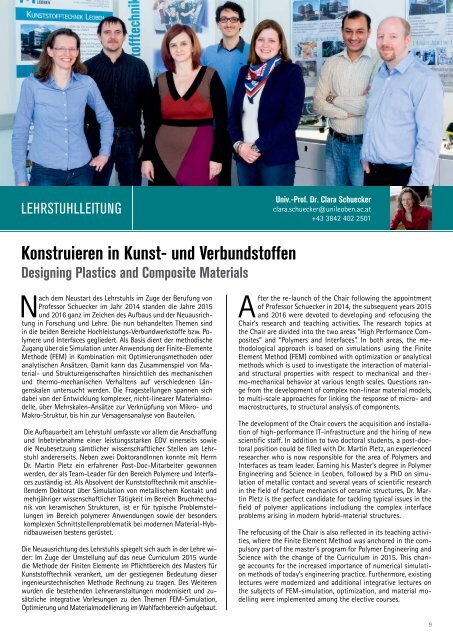Kunststofftechnik Leoben - Zweijahresbericht 2015 - 2016
Erfolgreiche ePaper selbst erstellen
Machen Sie aus Ihren PDF Publikationen ein blätterbares Flipbook mit unserer einzigartigen Google optimierten e-Paper Software.
LEHRSTUHLLEITUNG<br />
Univ.-Prof. Dr. Clara Schuecker<br />
clara.schuecker@unileoben.ac.at<br />
+43 3842 402 2501<br />
Konstruieren in Kunst- und Verbundstoffen<br />
Designing Plastics and Composite Materials<br />
Nach dem Neustart des Lehrstuhls im Zuge der Berufung von<br />
Professor Schuecker im Jahr 2014 standen die Jahre <strong>2015</strong><br />
und <strong>2016</strong> ganz im Zeichen des Aufbaus und der Neuausrichtung<br />
in Forschung und Lehre. Die nun behandelten Themen sind<br />
in die beiden Bereiche Hochleistungs-Verbundwerkstoffe bzw. Polymere<br />
und Interfaces gegliedert. Als Basis dient der methodische<br />
Zugang über die Simulation unter Anwendung der Finite-Elemente<br />
Methode (FEM) in Kombination mit Optimierungsmethoden oder<br />
analytischen Ansätzen. Damit kann das Zusammenspiel von Material-<br />
und Struktureigenschaften hinsichtlich des mechanischen<br />
und thermo-mechanischen Verhaltens auf verschiedenen Längenskalen<br />
untersucht werden. Die Fragestellungen spannen sich<br />
dabei von der Entwicklung komplexer, nicht-linearer Materialmodelle,<br />
über Mehrskalen-Ansätze zur Verknüpfung von Mikro- und<br />
Makro-Struktur, bis hin zur Versagensanalyse von Bauteilen.<br />
Die Aufbauarbeit am Lehrstuhl umfasste vor allem die Anschaffung<br />
und Inbetriebnahme einer leistungsstarken EDV einerseits sowie<br />
die Neubesetzung sämtlicher wissenschaftlicher Stellen am Lehrstuhl<br />
andererseits. Neben zwei DoktorandInnen konnte mit Herrn<br />
Dr. Martin Pletz ein erfahrener Post-Doc-Mitarbeiter gewonnen<br />
werden, der als Team-Leader für den Bereich Polymere und Interfaces<br />
zuständig ist. Als Absolvent der <strong>Kunststofftechnik</strong> mit anschließendem<br />
Doktorat über Simulation von metallischem Kontakt und<br />
mehrjähriger wissenschaftlicher Tätigkeit im Bereich Bruchmechanik<br />
von keramischen Strukturen, ist er für typische Problemstellungen<br />
im Bereich polymerer Anwendungen sowie der besonders<br />
komplexen Schnittstellenproblematik bei modernen Material-Hybridbauweisen<br />
bestens gerüstet.<br />
Die Neuausrichtung des Lehrstuhls spiegelt sich auch in der Lehre wider:<br />
Im Zuge der Umstellung auf das neue Curriculum <strong>2015</strong> wurde<br />
die Methode der Finiten Elemente im Pflichtbereich des Masters für<br />
<strong>Kunststofftechnik</strong> verankert, um der gestiegenen Bedeutung dieser<br />
ingenieurstechnischen Methode Rechnung zu tragen. Des Weiteren<br />
wurden die bestehenden Lehrveranstaltungen modernisiert und zusätzliche<br />
integrative Vorlesungen zu den Themen FEM-Simulation,<br />
Optimierung und Materialmodellierung im Wahlfachbereich aufgebaut.<br />
After the re-launch of the Chair following the appointment<br />
of Professor Schuecker in 2014, the subsequent years <strong>2015</strong><br />
and <strong>2016</strong> were devoted to developing and refocusing the<br />
Chair’s research and teaching activities. The research topics at<br />
the Chair are divided into the two areas “High Performance Composites”<br />
and “Polymers and Interfaces”. In both areas, the methodological<br />
approach is based on simulations using the Finite<br />
Element Method (FEM) combined with optimization or analytical<br />
methods which is used to investigate the interaction of materialand<br />
structural properties with respect to mechanical and thermo-mechanical<br />
behavior at various length scales. Questions range<br />
from the development of complex non-linear material models,<br />
to multi-scale approaches for linking the response of micro- and<br />
macrostructures, to structural analysis of components.<br />
The development of the Chair covers the acquisition and installation<br />
of high-performance IT-infrastructure and the hiring of new<br />
scientific staff. In addition to two doctoral students, a post-doctoral<br />
position could be filled with Dr. Martin Pletz, an experienced<br />
researcher who is now responsible for the area of Polymers and<br />
Interfaces as team leader. Earning his Master’s degree in Polymer<br />
Engineering and Science in <strong>Leoben</strong>, followed by a PhD on simulation<br />
of metallic contact and several years of scientific research<br />
in the field of fracture mechanics of ceramic structures, Dr. Martin<br />
Pletz is the perfect candidate for tackling typical issues in the<br />
field of polymer applications includiung the complex interface<br />
problems arising in modern hybrid-material structures.<br />
The refocusing of the Chair is also reflected in its teaching activities,<br />
where the Finite Element Method was anchored in the compulsory<br />
part of the master’s program for Polymer Engineering and<br />
Science with the change of the Curriculum in <strong>2015</strong>. This change<br />
accounts for the increased importance of numerical simulation<br />
methods of today’s engineering practice. Furthermore, existing<br />
lectures were modernized and additional integrative lectures on<br />
the subjects of FEM-simulation, optimization, and material modelling<br />
were implemented among the elective courses.<br />
9


